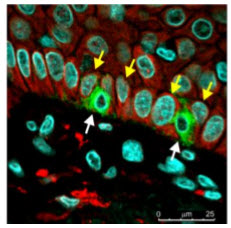Evaluate changes in expression during melanoma progression of p53, MDM4, MDM2 and other regulators of p53 activity.
Mark Shackleton et. al.

The survival and growth of cancer cells are controlled by key groups of proteins within them. One of these proteins is called p53. In numerous cancers, including melanoma, p53 protein doesn’t work properly. This allows damaged cells that cause cancer to survive, multiply and spread. In many cancers, p53 doesn’t work well because it is mutated.
However, we discovered that p53 doesn’t work well in most melanomas not because it is mutated (which it usually isn’t), but because it is directly inhibited by another protein called MDM4. To show this, we worked with overseas collaborators. We first used MMP melanoma samples to see whether MDM4 was present in melanomas, and found that it was and that its abundance was increased in most cases compared to normal melanocytes, the cells in which melanomas can begin. We next used sophisticated laboratory techniques and new developmental drugs to interfere with MDM4 function in melanomas cells. When we did this, p53 was reactivated and induced the melanoma cells to die in a way that synergised with existing melanoma therapies. This opens the way for testing in patients the approach of targeting MDM4 to reactivate p53 and kill cancer cells.
